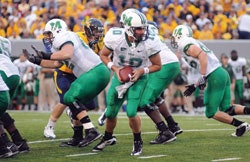As conferences seek collective frugality, some differ on the scope of proposed NCAA cost-saving legislation.
 Photo of the Marshall football team during a Conference USA game
Photo of the Marshall football team during a Conference USA game
The West Coast Conference won't be rotating its golf championships among various courses throughout California in the foreseeable future. For the next two years, at least, all championship events will be concentrated in the Bay Area. "That will cut costs for us, because three of our eight schools are in the Bay Area and so is our conference staff," says WCC commissioner Jamie Zaninovich. "We eliminate a lot of travel cost related to getting people here."
Economic realities have forced athletic conferences representing all regions of the country to re-examine their expenses, and trim wherever possible. But autonomous leagues often take different paths to frugality. Conference USA and the PacWest Conference (Division II's largest in terms of geographic area) are both changing scheduling practices to reduce the number of plane trips made by their respective member teams. However, C-USA has announced reductions in travel roster sizes for three sports while the PacWest has opted against such a mandate, citing student-athlete safety concerns.
"I don't necessarily think people are on the same page" when addressing cost containment, Zaninovich says. "There are no one-size-fits-all solutions."
Not yet, but proposed legislation currently in the NCAA pipeline might establish belt-tightening rules for all schools - at least those in Division I - to live by. The hope is to maintain competitive equity not only within but between conferences by eliminating such practices as teams making foreign trips or competing outside traditional seasons. "There are some measures you can take internally or as a conference," says Jim Muldoon, associate commissioner of the Pac-10 Conference, which led the NCAA legislation push. "For others, you really need everybody on board."
Plenty of politicking is anticipated, as an Aug. 15 deadline for review and comment at the Division I cabinet level fast approaches. Big 12 Conference officials in June announced support for the proposed elimination of printed media guides and regional track and field meets, but did not favor the elimination of foreign tours and nontraditional sports seasons. Meanwhile, Southeastern Conference administrators feel media guides should be permissible, so long as they're not distributed among prospective recruits. The SEC, whose members will soon benefit financially from the league's multimedia rights agreements with ESPN and CBS, has seen relatively little economic hand-wringing. Says associate commissioner Charles Bloom, "We have encouraged our schools to have discussions - not only collectively, but also in their own departments - but we have not taken any conference action to legislate cost-containment measures."
Perhaps no conference has addressed concerns more aggressively than Conference USA. All 12 members had been directed to make budget cuts even before the league office rolled out sweeping measures at its annual meetings in May. Among them: allowing only qualifying teams to participate in post-season championships in men's soccer (4), women's soccer (6), baseball (6), softball (8) and volleyball (8), with the possibility that the volleyball tournament will be eliminated entirely in 2010; combining the 2010 men's and women's basketball championships in Tulsa, thus sparing redundant travel for administrators, cheerleaders and bands; and the aforementioned reduction in travel squad sizes for football (from 70 athletes to 66), women's soccer (22 to 20) and men's soccer (20 to 18).
Assistant commissioner Courtney Morrison Archer reports a cooperative effort among athletic directors and university presidents in identifying cost-saving avenues, but says it's too soon to estimate what those savings might ultimately amount to. "It might be that we won't really know until it plays itself out, at least through the first year," she says, adding that the permanence of each change is likewise up in the air. "Our leadership will be keeping a close eye on things to make sure that these changes are in the best interest of our membership."
Most measures to emerge from spring conference meetings were posted by Princeton University executive associate director of athletics Michael Cross on his personal blog (www.ultimatesportsinsider.com) back in January. Cross also targets the length of recruiting windows and traditional competition schedules (ice hockey, in particular), the employment in certain sports of additional game officials and replay technology, even the use of environmental resources (stadium lights turned on during daytime TV broadcasts, the watering of synthetic field-hockey turf). "There are no easy answers," Cross says, "other than to take a step back and ask, 'What's core? What do we have to do to provide a high-quality experience for athletes?'"
It will be months before those questions are answered at the national level. Cost-cutting legislation, subject to alteration through the fall, won't see initial consideration by the Division I Legislative Council and the Division I Board of Directors until the 2010 NCAA Convention in January, with final review set for next April. It was at the 2009 convention that Penn State athletic director Tim Curley addressed a standing-room-only audience about the economic "craziness we've gotten ourselves into." At the time, he expressed hope that "we can put our competitive hats aside and look at the fiscal realities all of us are faced with."
"It's hard to stand up and say, 'You know what? We're doing too much," says Princeton's Cross. "You need guys like Tim Curley to say that. A guy from the Ivy League says it, and people go, 'Eh, it's the Ivy League. They don't really care anyway. They're just academic eggheads.' A guy from the Big Ten says it, and people pay attention. So in order for this stuff to change, you need some of the big boys to say, 'You know what? We're going to change, and we're going to lead the way on that change.'"





































